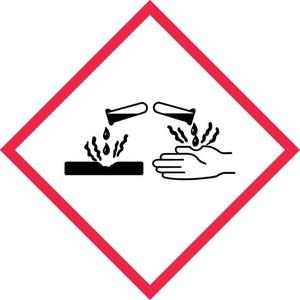

|
Edward Lowton
Editor |


|
| Home> | Health, Safety & Welfare | >Plant and machinery safety | >Handling and storing hazardous substances |
ARTICLE
Handling and storing hazardous substances
06 April 2023
It is often a challenge to know where to start when it comes to the handling and storage of hazardous substances. To help businesses get off on the right foot, Chemstore has produced a checklist covering some of the key points to consider

THIS CHECKLIST is designed to help you get started handling and storing of hazardous substances and provides a range of information which many of our customers have said they have found extremely useful.
- Make sure you are familiar with the GHS symbol for corrosives. If a product is corrosive it should be labelled with this symbol.
- If you have identified a product as corrosive - locate and read the associated Safety Data Sheet (SDS) which should be supplied with the product. Copies can be obtained from the substance's manufacturer and are often available online.
- Review your storage procedures in accordance with the SDS which will advise you how to store your corrosives. Be sure to check section 7 which covers handling & storage and section 10 which covers stability and reactivity because some corrosives can react with other substances. e.g. you can’t keep acids and alkalis together.
- As recommended in the SDS ensure all storage units are manufactured from materials that are compatible with the product e.g. don't store nitric acid in a steel storage unit because it will corrode. The correct storage material can usually be identified by primary containers e.g. If a substance is supplied in a plastic container it should be okay to be stored in a plastic container.
- If there are bulk storage requirements such as palletised drums or IBCs make sure that you have segregated storage once again and that the bunds are made from compatible material e.g. plastic.
- Be aware that unopened containers of corrosives such as bottles, 25 litre containers, 205 litre drums and IBCs (1000l containers) still pose a risk and should be securely bunded - for example they could be hit by a forklift or be dropped.
- Restrict access to corrosives and make sure that your corrosive storage units are lockable. Consider the risk to the wider public of corrosive products getting into the wrong hands.
- Be aware that products in use in a production process line can still pose a risk as they can suffer from leaks or pressure build ups. Consider whether they also need some form of safe storage.
- Ensure that units are well ventilated - vapours and fumes can build up from opened containers or in the event of a spillage which can cause harm to humans when opening the unit.
- If you are unsure about any factors regarding the storage of your products contact a hazardous materials storage expert such as Chemstore as we have a wealth of sector specific knowledge and will be able to advise whether your facilities are adequate or require a review - don't worry we will always give you an honest answer.
- Make sure that you have the correct PPE in place to handle the product - this will also be explained in section 8 of your SDS.
- As per global the global ANSI standard ANSI/ISEA Z358.1-2014 make sure you have adequate safety showers and eye washes close to anywhere that you are handling and storing a corrosive substance.
- Be aware that your SDS will advise that you need to wash any skin or eye exposure for 10-15 minutes - this can only be achieved with a safety shower or plumbed in eyewash.
- Have a plan and the necessary equipment in place to clear up a spill or have an emergency telephone number of someone who can help you who is trained in emergency response.
- In the event of an exposure always take the SDS with you to the emergency department.
- Don’t be afraid to ask for further information. The HSE, trade bodies and the manufacturers and suppliers of the chemicals as well as hazardous materials storage experts are all useful resources and can be particularly helpful with sector specific guidance.
For more information:
Tel: 0208 704 1807
MORE FROM THIS COMPANY
- University of Exeter solves hazardous storage issue
- Chemstore offers complimentary lithium-ion battery safety site surveys to tackle rising fire risks
- Safe storage of lithium-ion batteries
- Chemstore to launch software tool at CHEMUK
- Are your corrosives stored correctly?
- Free chemical storage survey
- Chemstore expands lithium-ion storage range
- Fully segregated fire rated storage
- Fire-proof lithium-ion battery box
- A burning issue
RELATED ARTICLES
OTHER ARTICLES IN THIS SECTION


















